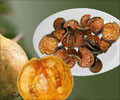The mechanism behind how a diet rich in antioxidants can prevent the leading cause of age-related blindness in developed countries, has been revealed in a new study.
Researchers found a link between two processes in the retina that, in combination, contribute to a disease called macular degeneration.They found antioxidants disrupt the link and extend the lifetime of irreplaceable photoreceptors and other retinal cells.
"The implication is that people at risk of macular degeneration could help prevent the disease by consuming antioxidants," said Heidi Vollmer-Snarr, a Brigham Young University chemist who earned a doctorate from Oxford and began work on this disease as a postdoctoral researcher at Columbia.
People struck with the disease first lose central vision and temporarily adjust by relying more on peripheral vision. Some eventually lose their vision entirely.
The study found a destructive synergy between the build-up of a compound called A2E and damage to cellular 'power plants' called mitochondria. A2E is a natural byproduct of cellular activity that, unlike other compounds, won't break down or be disposed by the body.
A problem occurs when A2E encounters oxidative stress created by light exposure. In these circumstances, A2E disrupts energy production in mitochondria.
Advertisement
The result is more A2E buildup, and the cycle of destruction hastens the death of these vital visual cells, which are not replaced when they die.
Advertisement
Seeing this process play out in the retina has given Vollmer-Snarr a novel idea for attacking harmful growths in the body.
The strategy would involve delivering potentially disruptive compounds like A2E to the target and then using light to trigger the damage.
The study appears online and is published in an issue of the Journal of Biological Chemistry.
Source-ANI
RAS/V















